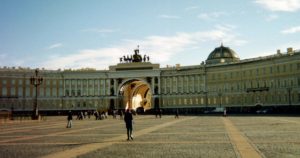Palace Square, St. Petersburg, Russia; photo by Natylie Baldwin
On July 27th, a new round of sanctions against Russia were passed by both houses of Congress with only a handful of legislators opposing. The new sanctions include penalties against foreign entities that do business with Russian fossil fuel companies. The sanctions were enacted with “election interference” used as the primary justification. Trump, who would be facing an override of any veto, is expected to sign it. The first part of Russia’s response was swift – booting out hundreds of American diplomats from the country and allowing only the same number of diplomats as those currently allowed to serve in the United States from Russia. CommonDreams reported the following details:
Members of the U.S. diplomatic staff in Russia will be expelled in the coming weeks, following an order on Friday by the Russian Foreign Ministry. The move was made in response to a new economic sanctions bill that passed in both houses of the U.S. Congress.
Russia said it would also seize two properties used by the U.S. Embassy by next week. Reuters cited a report by Russia’s Interfax news agency saying “hundreds” of employees would be affected, by the exact number was not clear.
….The new sanctions would impact the Russian energy and financial sectors, and the European Union has expressed concerns that they could also affect European companies involved in the building of a new pipeline from Germany to Russia.
On Thursday, Russian President Vladimir Putin said he “very much regrets” the strained relations between the U.S. and Russia, and accused the U.S. of displaying “boorish behavior” and “anti-Russia hysteria.”
The Russian foreign ministry called allegations that it meddled in the 2016 election “an absolutely invented pretext.”
Just prior to the passing of the legislation, it was condemned by the EU president, Jean-Claude Junker, the French Foreign Ministry and the German Foreign Office, citing the undermining of European energy security, economic interests and violation of international law.
Reuters reported on July 31st that the German economic minister had stated that the EU should consider counter-measures:
BERLIN (Reuters) – New sanctions against Russia proposed by U.S. lawmakers and which could harm European firms violate international law and the European Commission should consider counter-measures, the German economy minister was quoted on Monday as saying.
“We consider this as being against international law, plain and simple,” Brigitte Zypries told the Funke Mediengruppe newspaper chain. “Of course we don’t want a trade war. But it is important the European Commission now looks into countermeasures.”
The German government and business leaders have said the new sanctions passed this month by the U.S. House of Representatives could prevent German companies from working on pipeline projects [Nordstream 2] that they say are essential to Germany’s energy security.
Pepe Escobar provided his analysis of, not only the provocation of European allies that the legislation will be responsible for, but how some of its provisions will effectively cripple any attempts by Trump (or any future president) to normalize relations with Russia:
Trump will be required to justify to Congress, in writing, any initiative to ease sanctions on Russia. And Congress is entitled to launch an automatic review of any such initiative.
Translation; the death knell of any possibility for the White House to reset relations with Russia. Congress in fact is just ratifying the ongoing Russia demonization campaign orchestrated by the neocon and neoliberalcon deep state/War Party establishment.
Economic war has been declared against Russia for at least three years now. The difference is this latest package also declares economic war against Europe, especially Germany.
That centers on the energy front, by demonizing the implementation of the Nord Stream 2 gas pipeline and forcing the EU to buy US natural gas.
Make no mistake; the EU leadership will counterpunch. Jean-Claude Juncker, president of the European Commission (EC), put it mildly when he said, “America first cannot mean that Europe’s interests come last.”
Escobar reported on further retaliation set to be implemented by Russia:
Kommersant has reported that Moscow, among other actions, will retaliate by banning all American IT companies and all US agricultural products from the Russian market, as well as exporting titanium to Boeing (30% of which comes from Russia).
As British Russia expert, Richard Sakwa pointed out in an interview with the Real News Network, Washington is making a feeble attempt to force Europe to abandon its current reliable, economical and geographically close source of natural gas from Russia and buy fracked gas from the U.S.:
In the short-term, this works to the advantage of the fracking gas lobby, because they were talking specifically about being able to fill the gap, perceived gap or possible gap, in European gas markets, by exporting, selling LNG, liquid of natural gas. That may be to their advantage of the gas fracking industry.
Sakwa goes on to explain how this may be a bridge too far with most of western Europe:
It’s the European companies who are hopping mad at the moment, to be absolutely honest, but just in this last few months, the German exports to Russia have gone up 20%, despite sanctions. What this is doing is going back to the 1980’s when the Reagan administration tried to stop the building of the [inaudible 00:10:30] and the West [inaudible 00:10:32] gas pipelines to Western Europe in the first place. Then, posed quite severe sanctions, but the Germans refused to accept it. Now, what’s happening, this is going to drive a wedge between Europeans and the United States.
He also goes on to say how, based on his recent visits to Russia, he is privvy to how much pressure Putin is under, from Russians across the political spectrum, to intensify his response to progressively more provocative actions by Washington that have accumulated over the past several years:
…these sanctions are a declaration that US law is universal across the world. It isn’t just affecting US companies, it’s affecting any company initially, even which had a slight involvement in an economic energy project in which a Russian company was involved. After discussion, it went up to where Russian companies got about 35% engagement. It’s quite draconian, so it’s why I say, yes it’s [incremental 00:07:35] in some ways, but it’s a huge jump at the same time. I don’t know what has [seized 00:07:41] Congress in imposing these draconian measures, and this is only the beginning of the response.
This is the first element. Putin himself is trying to keep these down, but he has been under enormous pressure. I was in Saint Petersburg a few weeks ago and even people with [inaudible 00:08:03] liberal views were saying, condemning Putin for not having reacted to Obama’s provocations at the end of December last year. He has done the minimum really to satisfy Russian public opinion who is, as you can imagine, over the last few months, just getting fed up with this, what they perceive to be craziness coming out from Washington.
Listen to or read the transcript of the full interview with Professor Sakwa here.
So the question is: how angry is Europe, led by Germany, and how far are they now willing to go to oppose Washington’s folly and assert their own interests? Escobar is talking about the possibility of a German-Russian entente:
And that bring us to the “nuclear” possibility in the horizon; a Germany-Russia alignment in a Reinsurance Treaty, as first established by Bismarck. CIA-related US Think Tankland is now actively discussing the possibility.
As anyone who has followed my previous writing, including my half of the Ukraine book, will know, since the time of the British empire, the thought of a German-Russian alliance has given Anglo-American imperialists the willies (see Alford Mackinder and the late Zbig). If Washington insists on giving Germany the proverbial finger in terms of its economic interests, the Eurasian Century may get a quicker jumpstart. More from Escobar:
The Russia-China strategic partnership is extremely attractive to German business, as it smoothes access via the Belt and Road Initiative (BRI). According to the business/political source, “the US is at war with China and Russia (but not Trump, our President) and Germany is having second thoughts about being nuclear cannon fodder for the US. I have discussed this in Germany, and they are thinking of renewing the Reinsurance Treaty with Russia. No one trusts this US Congress; it is considered a lunatic asylum. Merkel may be asked to leave for the leadership of the UN, and then the treaty would be signed. It will shake the world and end any thought of the United States being a global power, which it isn’t anymore.”
Will Germany really stand up to Washington this time?

It’s not a foregone conclusion by any means. Time will tell.
In the meantime, the deputy Foreign Minister of Russia, Sergei Ryabkov, told ABC News in an interview after the sanctions legislation had passed Congress that Russia may have to consequently consider alternatives to the U.S. dollar as a reserve currency.
Secretary of State, Rex Tillerson, stated during a lengthy press conference on August 2nd, that he and President Trump are disappointed with the sanctions but feel that the overwhelming congressional support means that they are stuck with them. However, Trump and Tillerson tend to try to work around them while continuing to pursue improved relations with Moscow:
I think the American people want the two most powerful nuclear nations in the world to have a better relationship. I don’t think the American people want us to have a bad relationship with a huge nuclear power. But I think they are frustrated, and I think a lot of this reflects the frustration that we’ve not seen the kind of improvement in the relationship with Russia that all of us would like to see.
….The action by the Congress to put these sanctions in place and the way they did, neither the President nor I are very happy about that. We were clear that we didn’t think it was going to be helpful to our efforts. But that’s the decision they made. They made it in a very overwhelming way. I think the President accepts that, and all indications are he will sign that, that bill. And then we’ll just work with it, and that’s kind of my view is we’ll work with it. We got it. We can’t let it take us off track of trying to restore the relationship.
Nikolas Gvosdev has written an interesting article over at the National Interest, speculating on how Trump could avoid enforcing the sanctions in the manner that Congress would like, citing the notorious “signing statement” as one of several options Trump could potentially use to downplay the effect of the sanctions, giving himself wriggle room to de-escalate:
Congressional legislation in the area of foreign policy is always tricky, because while Congress can mandate and fund, it is the president who chooses the manner, style, speed and pace of execution. After all, Congress could authorize and all-but-insist upon the shipment of “defensive weapons” to Ukraine, but it could not compel President Barack Obama to actually deliver arms.
Both Obama and President George W. Bush routinely used “signing statements” when presented with pieces of congressional legislation which had provisions that they opposed if they were not prepared to veto the entire bill. Bush and Obama have left President Donald Trump a bipartisan precedent of a chief executive using such statements to effectively reinterpret the intent of congressional legislation, particularly in designating congressional mandates as “advisory” when they believed that Congress was infringing on their Article II authority. This is not to suggest that Trump can simply negate sanctions on his own authority, but he can easily spell out in such a document how he understands the legislation and how he plans to carry out its provisions.
Read the full article here.
Meanwhile, Russia has just signed a $2.5 billion deal with another Washington-sanctioned nation to provide train cars for Iran’s extended and upgraded rail infrastructure, partly in anticipation of its role in China’s New Silk Road initiative. According to Forbes:
Russia and Iran signed a $2.5 billion deal on Monday to start up a much-needed rail wagon production operation. The agreement was forged between the Industrial Development and Renovation Organization of Iran (IDRO) and Transmashholding, who is Russia’s largest rail equipment supplier. The two sides will set up a new joint venture, which will be 80% owned — although completely funded — by the Russian partner.
Iran is currently in the midsts of what could be called an infrastructure building bonanza. Emerging from decades of sanctions which left much of the country’s transportation infrastructure descending into proverbial ruins, Iran has embarked upon a near complete rebuild of its highway and rail networks. The country is expected to add on 15,000 kilometers of new rail lines in the next five years alone — a rapid expansion which is going to require 8,000-10,000 new wagons each year.
Reinvigorating the transport sector is a key part of Iran’s vision to leverage its geographic position to become a vibrant hub of trans-Eurasian trade, which plugs nicely into China’s Belt and Road Initiative and Russia’s continued economic activity in the post-Soviet neighborhood. Iran is also a core partner, along with Russia and India, in the emerging North-South Transport Corridor, which seeks to create a multimodal trade route that would cut the lead time between cities on the west coast of India and St. Petersburg in half, and has also worked out its territorial squabbles with Russia over the Caspian Sea.
Well, it sure doesn’t sound like Russia and Iran are wasting any time weeping over Washington’s scorn. They’re moving on with mutually beneficial projects in their own neighborhood.
*************************************************************************
Added on to the very short list of positive things Trump has done, the U.S. program supporting rebels (via the CIA) in Syria has been suspended. There are some reports that Trump was motivated to do so after being made aware of the sickeningly notorious video of CIA-backed rebel group Nour al-Din al-Zenki beheading a Palestinian-Syrian boy. ZeroHedge has a write-up about this that relies primarily on a report written by a man who works for a Neocon think tank in Washington. It was originally published at the Weekly Standard, which is a Neocon publication. Therefore, this should be viewed with some degree of skepticism until it can be independently verified. Quoted below is the gist of the article:
Trump wanted to know why the United States had backed Zenki if its members are extremists. The issue was discussed at length with senior intelligence officials, and no good answers were forthcoming, according to people familiar with the conversations. After learning more worrisome details about the CIA’s ghost war in Syria—including that U.S.-backed rebels had often fought alongside extremists, among them al Qaeda’s arm in the country—the president decided to end the program altogether.
Ben Norton, writing for Fairness and Accuracy in Reporting (FAIR), observed how the corporate media again showed its tendency to carry water for Washington’s warmongers, by lamenting Trump’s decision to end the program:
If one only read corporate media reporting, however, you would likely think that the termination of the CIA program was an abject tragedy. Spin doctors at major news outlets depicted the Trump administration’s decision as variously a spineless concession to the evil Russian puppet master and/or a wretched abandonment of a supposedly noble US commitment to “freedom and democracy.”
The Washington Post (7/19/17) took the lead with the article “Trump Ends Covert CIA Program to Arm Anti-Assad Rebels in Syria, a Move Sought by Moscow,” which framed the development almost entirely as a concession to the Kremlin. It cited Charles Lister, a hawkish analyst who has for years lobbied for US-led regime change in Syria. “We are falling into a Russian trap,” lamented Lister, who works for think tanks funded by the US, Saudi Arabia, Qatar and the UAE, and never fails to toe the line.
Western corporate media compliantly echoed the Post‘s talking points: TheGuardian (7/20/17) declared “Donald Trump Drops CIA Program in Syria ‘in Bid to Improve Russia Ties’”; USA Today (7/20/17) said, “Trump’s Cutoff of Aid to Syrian Rebels Marks Victory for Assad, Russia and Iran”; “Donald Trump Ends Covert CIA Aid to Syrian Rebels in ‘Win’ for Russia,” the Telegraph (7/20/17) added.
The Washington Post‘s resident unofficial CIA PR rep, David Ignatius (7/20/17), practically boasted that “CIA-backed fighters may have killed or wounded 100,000 Syrian soldiers and their allies over the past four years.”
A top US general later made it clear that the halt of the CIA operation was not about Russia. But this mattered little to the Fourth Estate; the “Kremlin plot” seed had already been planted.
The idea that it might actually be good to end a program that even establishment think tanks conceded empowered Al Qaeda and other jihadist militant groups in Syria, regardless of what Russia desires, was never entertained.
Now seems like a good time to review how Washington got involved in trying to foment regime change in Syria from 2011 on. Two excellent articles discussing this background have recently been published. The first is by the award-winning independent Middle East journalist, Gareth Porter, and appeared in the American Conservative – an outlet that is ideologically more in line with the Edmund Burke tradition of conservatism and supports a mostly non-interventionist foreign policy.
An excerpt:
One of the keys to understanding its origins is that the program was launched not because of a threat to U.S. security, but because of a perceived opportunity. That is always a danger sign, prompting powerful national-security bureaucrats to begin thinking about a “win” for the United States. (Think Vietnam and Iraq.)
The opportunity in this case was the rise of opposition protests against the Assad regime in spring 2011 and the belief among national security officials that Assad could not survive. The national-security team saw a shortcut to the goal. Former Obama administration official Derek Chollet recalled in his book The Long Game that Obama’s advisers were all talking about a “managed transition” and urging Obama to publicly demand that Assad step down, according to Chollet. What that meant to Obama’s advisers ws bringing pressure from outside, including providing arms to the opposition.
That was wishful thinking not only in regard to the willingness of an Alawite-dominated regime to hand over power to its sectarian foes, but in regard to the assumed Iranian willingness to go along with toppling the regime. Not one of Obama’s advisers had sufficient understanding of regional dynamics to warn the President that Iran would not allow of Syrian ally to be overthrown by an opposition supported by Sunni states and the United States.
But the decisive factor in pushing the administration toward action was the pressure from U.S. Sunni allies in the region—Turkey, Saudi Arabia and Qatar—which began in autumn 2011 to press Obama to help build and equip an opposition army. Turkey was the leader in this regard, calling for Washington to agree to provide heavy weaponry—including anti-aircraft and anti-tank missiles—to the rebel troops that didn’t even exist yet, and even offering to invade Syria to overthrow the regime if the U.S. would guarantee air cover.
In the ideology of the national security elite—especially its Democratic wing—regional alliances are essential building blocks of what is styled as the U.S.-sponsored global “rules-based order.” In practice, however, they have served as instruments for the advancement of the power and prestige of the national security bureaucracies themselves. The payoffs of U.S. alliances in the Middle East have centered on the military bases in Turkey, Saudi Arabia, and Qatar that allow the Pentagon and the military brass to plan and execute military operations that guarantee extraordinary levels of military spending. But enormous Saudi arms purchases and the financing of any covert operations the CIA doesn’t wish to acknowledge to Congress have long been prime benefits for those powerful organizations and their senior officials.
(Emphasis mine). Read the full article here
The second article is from former weapons inspector, Scott Ritter, also published at the American Conservative and goes into the details of how weapons were funneled to “rebel” groups in Syria starting in 2011, after Qaddafi was illegally overthrown and murdered in Libya:
The train and equip mission of the CIA in Syria can be traced back to the spring of 2011, when a revolution broke out in Libya against the dictatorial rule of Muammar Gadhafi. Backed by NATO airpower, anti-regime fighters were able to establish control over large areas inside Libya. The CIA began a program to train and equip these fighters, supplying weapons to Qatar and the United Arab Emirates, who in turn shipped these weapons to Libya, where they were turned over to Libyan rebels. (This circuitous route was chosen to avoid the U.S. being in violation of a UN embargo against weapons deliveries to Libya.)
In August 2011, in the aftermath of the capture of the Libyan capital of Tripoli by rebel forces, Qatar began diverting arms originally intended for Libya to Turkey, where they were turned over to rebel forces that had, since June of 2011, been fighting against the regime of Syrian President Bashar al-Assad. These rebels were grouped together under the umbrella of the Free Syrian Army (FSA), an ostensibly secular resistance group that was in reality controlled by the Syrian branch of the Muslim Brotherhood, an Islamist organization that had been crushed by Bashar al-Assad’s father back in the early 1980’, and was operating in exile in Turkey, Lebanon, and Jordan. While the CIA was not directly involved in this activity, CIA personnel in Libya and Turkey monitored these shipments to make sure no sensitive weaponry, such as hand-help surface-to-air missiles, made their way into Syria. This effort, which involved billions of dollars of arms, including those provided by the United States for the express purpose of aiding Libyan rebels, continued through 2012 and into 2013. (The U.S. Ambassador to Libya, Christopher Stevens, who was killed in an attack on the American Consulate in Benghazi in September 2012, was involved in coordinating these weapons transfers.)
As the fighting in Syria expanded in scope and scale, the number of anti-regime combatant organizations increased. The FSA took on an increasingly Islamist character, and many of its fighters defected to more extreme organizations, such as al-Nusra (an Al Qaeda affiliate). Many of the CIA-provided weapons being shipped by Qatar through Turkey made their way into these Islamist units, with the unintended result being that the U.S. was actively arming Al Qaeda and other extremist entities openly hostile to American interests. In an effort to control the flow of weaponry into Syria, President Obama authorized the CIA to formally take over the process of training and equipping Syrian rebels. This operation, known by its codename, Timber Sycamore, was run out of Turkey and Jordan with the full support of both governments.
Read the complete article here
Of course, designs on Syria by Washington did not start in 2011. As Stephen Gowans (author of Washington’s Long War on Syria) details in a presentation available below, it has been going on since the Cold War.
https://www.youtube.com/watch?v=-HOgPsZkCM8
Note: Gowans’ presentation begins approximately at the 10 minute mark.






